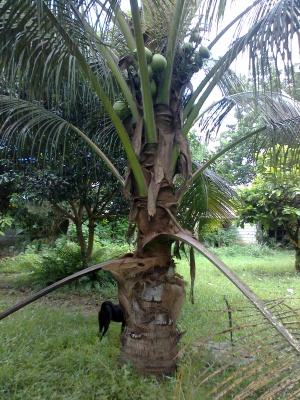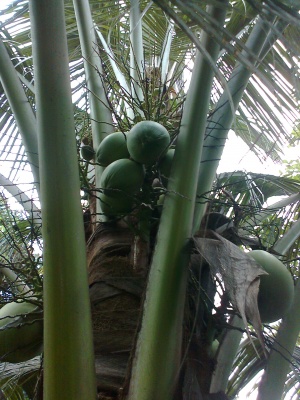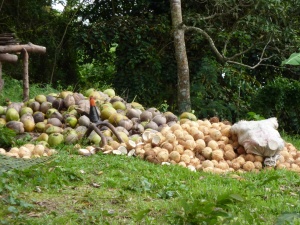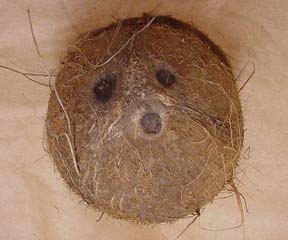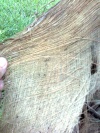LOG IN. UPLOAD PICTURES.
The Philippines has Zambo Mart to help propagate the Chavacano Language.
Difference between revisions of "Coconut"
| Line 66: | Line 66: | ||
</div> | </div> | ||
As the coconut grows, the very tip or the shoot of the coconut is surrounded by this "blanket". It looks like a woven thread, it is interlaced. As the leaves form and grow out, this blanket surrounds the trunk of the coconut tree. As the leaves grow old and fall out of the tree so does the "blanket". The common folks use this "ginete" as a natural filter. In fact the "tuba" or coconut sap gatherers use this "blanket" as a filter to filter the "tuba" before they pour it into the final container. | As the coconut grows, the very tip or the shoot of the coconut is surrounded by this "blanket". It looks like a woven thread, it is interlaced. As the leaves form and grow out, this blanket surrounds the trunk of the coconut tree. As the leaves grow old and fall out of the tree so does the "blanket". The common folks use this "ginete" as a natural filter. In fact the "tuba" or coconut sap gatherers use this "blanket" as a filter to filter the "tuba" before they pour it into the final container. | ||
<br> | |||
<br> | <br> | ||
<br> | <br> | ||
Revision as of 00:36, 3 December 2012
Coconut The Giving Tree
by Franklin H. Maletsky
Coconut tree
The common names for the coconut are coconut palm, coco palm, and of course the coconut tree. The scientific name is cocos nucifera. The scientific name cocos nucifera was derived from the Portuguese language. Cocos is Portuguese for monkey, in reference to the face that appears on the stripped nut. Nucifera means nut bearing. The coconut tree is an ever giving tree. Almost every part of the coconut tree is useful. The Coconut Palm or coconut tree (Cocos nucifera) is the only species in the cocos family that grows to 30 meters or almost 100 feet tall. The term coconut refers to the fruit of the coconut palm or coconut tree.
Coconut trunk
The coconut trunk can be used for lumber. In most of the countries where coconut trees are grown, the coconut tree is protected by the government due to rampant harvesting even of young coconut trees for coco lumber. The coconut tree can live to over 60 years. The coconut trunk narrows as it towers to the sky and close to 100 feet tall. The older the coconut tree, the better it is for lumber. The old coconut trunk can be so tough that a 4" nail would bend as it is hammered in. The softest part of the coconut trunk is the middle since it is the newest growth or part of the tree. The coconut trunk gets harder and tougher as it moves away from the center. The hardest part of the coconut trunk is the part immediately under the coconut tree skin because it is the oldest part of the coconut tree.
Coconut sap
The coconut sap is used to produce coconut wine, coconut vinegar and coconut gel. The sap of the coconut is gathered from the unopened coconut bud. The coconut bud is cylindrical in shape that tapers at the top and bottom (like a torpedo). The tip of the bud is cut with a sharp blade before it opens to flower. The coconut bud is then secured with strings around it from the top to bottom so that it may not open and flower. A container is then positioned to receive the dripping coconut sap from the cut bud. The sap is collected daily and the bud is cut again or "bled". The cut is usually about an eighth of an inch per day. A mature coconut tree can yield up to a gallon of sap daily. Some people like to drink the coconut sap fresh from the coconut tree. Others prefer to drink it after it ferments for a few hours thereby raising the alcoholic content of the sap. When this coconut sap is distilled it can produce about 96 proof coconut wine.
Coconut leaves
The coconut leaf is used for several things. firewood, broom, thatch roof, baskets, and other containers.
Coconut fruit
From the coconut fruit derives the:
- coconut meat
- coconut husk (coir)
- coconut shell
- coconut water or juice.
Coconut Meat
The most common product of the coconut meat is coconut oil. There are three ways of making coconut oil; one is RBD (Refined, Bleached & Deodorized), home cooking, cold pressed. The RBD oil is produced (by large factories) from copra (dried coconut meat). Making copra is accomplished by drying the meat either by sun or by fire. Home cooking is accomplished by grating the coconut meat, squeezing the juice out of it, then cooking the juice in a pan over an open fire. Cold pressed is where VCO (virgin coconut oil) comes from. This method can be home made or commercialized by big factories.
Coconut shell
Used for ornamental products and charcoal. Used as a piggybank.
Used as a bowl: When the coconut is split in half, with the "eyes" facing up or down, the other half without the "eyes" can be used a bowl. The bottom of this half shell is not flat so it leans to the side. In order to use the half coconut shell as a serving bowl a base must be made. The base is usually made out of any piece of wood (4"x4"x2"). The center of this base is carved out, so there is a hole in a form of a circle in this base. The coconut bowl is then placed in this hole of the base. It is a perfect fit. The hot soup in the bowl won't spill as it passed around the table.
Coconut flowers
The coconut flower starts off as a pod or bud shaped like a torpedo. When the coconut bud opens there are several pistils. The pistils are connected to the stem of the flower and they are staggered. The stem where the pistils come out can be 10 to 12 inches long. Each pistil that extends out from the stem is about 10 to 16 inches long. The coconut flower looks like an oak tree without leaves.
There are several "seeds" in each of these pistils. Not all the "seeds" mature. Each of these seeds that mature turn into the coconut fruit. There can be 5 to 12 coconuts attached to the coconut flower.
After the harvest, these coconut flowers are sometimes used as a broom or rake.
Coconut Husks
The husk is the outer layer of the coconut. The coconut husk surrounds the coconut shell. The skin of the coconut husk is very smooth.
Coconut Coir
The fiber between the outer shell and the skin of the husk is called the coir. Coir is twisted and prepared to be made into rope. The coconut coir is used for flower pots, filters, seat cushions, and other creative things.
Coconut root
The coconut root is about 1/3 of an inch thick. Used as medicinal concoction for stomach aches
Coconut "Blanket"
As the coconut grows, the very tip or the shoot of the coconut is surrounded by this "blanket". It looks like a woven thread, it is interlaced. As the leaves form and grow out, this blanket surrounds the trunk of the coconut tree. As the leaves grow old and fall out of the tree so does the "blanket". The common folks use this "ginete" as a natural filter. In fact the "tuba" or coconut sap gatherers use this "blanket" as a filter to filter the "tuba" before they pour it into the final container.
Virgin Coconut oil the best antidote against obesity and diabetes
By MEDIATRIX P. CRISTOBAL
For several decades, man's search for sensible weight loss program remained futile. People buy to the hype of fast, exercise-free diet pills, and often times end up either frustrated because of unfulfilled results, or worse with yo-yo effects.
Dr. Nestor Fuertes, a respected Australia-based Filipino doctor and Virgin Coconut oil advocate, said the most effective weight loss supplement had been right under our noses – the VCO. "The difference with VCO (compared to other diet pills) is that you take it, it basically feeds your cell immediately. The fats are instantly converted into energy, so no fats deposited in your body." He added.
Foods taken everyday, such as pork or hamburger, usually contain bad fats, which are deposited and accumulated in the body - usually in the mid-torso section, or locally known as "bilbil."
VCO's medium chain triglyceride is the good kind of fat, set highly apart from all the other fats found in our everyday food. "Once we actually swallow the VCO, it immediately goes to the liver and it will be redistributed immediately into the cell. It repels attraction with fats…after it is absorbed by the cell, it is immediately converted to energy." He explained.
He added that VCO has a thermogenic effects on the body, that slowly, but effectively increases the body's metabolic rate making it easier for the body to burn fats and perform better. VCO is famous for the plethora of health benefits it offers. Over the years, it gained popularity and has been ubiquitous in the local grocery aisles. It is only recently that health practitioners advocate on its potential slimming effects. Typically, an individual taking VCO regularly may lose 4 to 6 pounds in just a month.
He cited a study in a prestigious university in Australia which notes overweight men who took high doses of VCO have lost a significant 3-4 kilograms in just four months. But Fuertes said such pace is not usually recommended, because high doses of VCO causes loose motion syndrome and 4-6 pounds weight loss is too drastic for the body system.
Fuertes recommends taking 1 to 2 tablespoons of VCO at least half an hour before meals. Anyone who've just been introduced to VCO may start with a lower dosage of ½ teaspoon. A person needs to take the required dose twice a day to achieve the desired results, he said. Though it has no claims of any therapeutic effects, VCO's potential to cleanse clogged arteries out of the bad fats had been proven effective not only here. His patients abroad have testimonies about the effects of VCO in their health and wellness.
"VCO may actually push you right back into being normal and healthy," he added. He cited too much fat deposit in the body retards its functions and is oftenly manifested in the fastest growing lifestyle diseases nowadays known as obesity.
The 2006 world health organization figures said that 3.3 million Filipino female's aged between 20 to 25 are over-weight. Half of them are obese. About 1.2 million Filipino males on the other hand are overweight and half of them are obese. What makes the figures alarming is it occurs to population who are at their productive stage, peaking at the age 35 and half of these obese population are likely to be diabetic, hypertensive and are at risk of heart attack.
"Why do we need to get into this stage before we do something?" he said. "Taking 2 tablespoon of VCO twice a day coupled with a sensible diet and exercise may stop you from progressing from being obese to hypertensive, diabetic, etc,." he advised.
